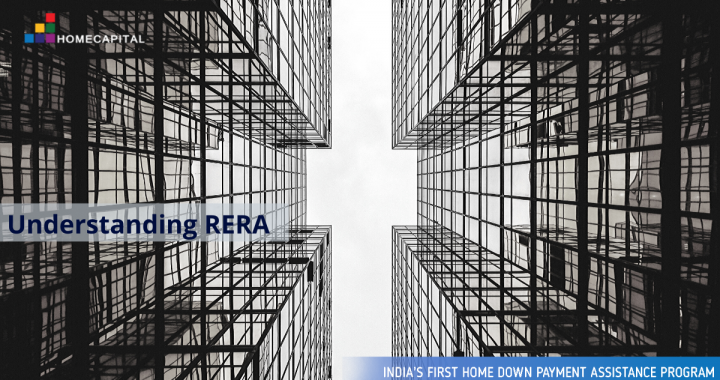
Chapter 6: RERA
April 11, 2019 . Home Buyer's Guide . 10 min readThe Real Estate (Regulation & Development) Act, 2016 (RERA) was enacted by the Indian Parliament in 2016 to regulate the real estate industry in India with the objective to ensure transparent and fair transactions. It is a landmark development and a much-needed consumer-oriented reform introduced with the aim to usher in a new era of transparency and accountability. RERA is a blessing for home buyers as it is launched with the vision to create a more balanced ecosystem in their favour. Our HomeCapital experts for put together this guide to educate you about the RERA Act.
The purpose of RERA is to curb the inflow of black money into the primary and secondary markets and help end speculation & price control. It is introduced to improve the financial discipline of the developers as they will not be able to divert funds from a given project. This will ensure timely completion of the projects.
About the Act
Real Estate (Regulation & Development) Act, 2016 (RERA) is an Act of Parliament of India passed in March 2016. It received the consent of the President of India on 25th March 2016 and came into force from 1st May 2017. The Act aims to establish a Real Estate Regulatory Authority in each state and union territory for the promotion and regulation of the real estate industry. It aims to ensure the sale of real estate properties (plots, apartments buildings) and projects in an efficient and transparent manner by protecting the interests of consumers.
The Act is applicable to ongoing and upcoming commercial and residential projects. However, it is not applicable to redevelopment, repair or renovation projects that do not include new allotment, selling, advertising and marketing.
The chance of a delayed possession has been the biggest cause of concern for any home buyer. In the absence of a regulator and no rules in place, it was the home buyer who had to suffer at the hands of builders. Now with RERA, each state and union territory will have its own Regulatory Authority (RA). The RA is responsible for framing rules and regulations according to the Act.
The Act aims to empower the RA or an Adjudicating Officer to resolve disputes and pass judgements. It also aims to create Appellate Tribunals to hear appeals against the orders, directions or decisions of the RA or the Adjudicating Officer.
Under the Act, the centre and the states are stipulated to notify their own versions of RERA based on the model rules framed under the Parliament Act within six months of its commencement date.
Features of the Real Estate (Regulation & Development) Act, 2016 (RERA)
- Mandatory registration: All the real estate developers across the country need to register mandatorily with the Real Estate Regulatory Authority of the state or union territory where the projects are developed. The projects (total size >= 500 sq.m. or number of apartments >= 8), which are new, ongoing or where the completion/occupancy certificates have not been obtained come under the purview of RERA. The Act also calls for compulsory registration of real estate agents.
- Deliver as promised: The promises made by the developer/promoter would be legally binding on them. Developers will now have to notify the buyers of the ‘carpet area’ of the units sold to them. They will now have to provide a declaration along with a written affidavit about the time period within which a project or a specific phase would be completed. The promoter is liable to compensate the buyers if any incorrect or false statement is given related to the building, apartment, plot or real estate project with a full refund of the property value and the interest amount.
- Customer centricity: RERA aims to protect the interest of property buyers and has empowered them with enormous rights to deal with errant developers. Its penal measures act as a deterrent for builders against cheating home buyers. RERA also contains provisions for speedy and effective redressal to aggrieved buyers.
- Financial discipline: Developers cannot accept more than 10% of the cost of unit sold as an Advance or Application Fee from the buyers. The developers will now have to deposit 70% of the amount collected from home buyers for the project in an Escrow Account, which is an entirely different dedicated account. This account is maintained in a scheduled bank to cover the cost of land and construction. The withdrawals from this account depend on the progress of the project, which has to be certified by an engineer, authorised architect or a Chartered Accountant. All the project accounts need to be audited on a timely basis, failing which would lead to freezing of the account by the RERA.
- Land title: The developers must provide a declaration that they possess the legal title to the land on which the development will take place. The declaration has to be supported by legally valid documents and a written affidavit. A separately written affidavit has to be provided by the promoter stating that the land is free from all encumbrances.
Consequences of non – compliance
In case of non-compliance with the RERA rules & regulations, the developers can lose the registration of the project. They can also face imprisonment up to a maximum period of three years and/or can be fined up to a maximum of 10% of the total estimated project costs.
In case of a default or delay in granting possession of the property by the developer as stipulated in the ‘agreement of sale’, the buyers have a right to withdraw from the project and get a full refund of the amount along with a certain rate of interest. Even if the registration of the developer/project is cancelled, the buyers will have full right to refund.
In case the buyer does not want to withdraw from the project and ask for a refund, the developer has to compensate the buyer every month with interest payments until the possession is granted. In case the buyers default in making payments to the developer, they will also have to compensate the developer with the same rate of interest.
The rate at which the developers or the buyers will compensate each other will be the same and will be determined by the state RA. This rate may differ from state to state. In most states, the rate of compensation is SBI MCLR + 2%.
The Real Estate Appellate Tribunal (REAT)
If buyers are not satisfied with the decision passed on by the Real Estate Regulatory Authority or the Adjudicating Officer, they can approach the REAT to challenge the same.
Benefits for the home buyers
- Developers cannot delay the project. If delayed, the buyers should be compensated at the rate of SBI MCLR + 2% by the developers.
- Home buyers need to pay only for the carpet area.
- The developers must inform the buyers about any minor changes or additions to the project.
- For any major changes or additions, the developer must seek the consent of at least 2/3 of the buyers.
- Consent of the above-mentioned ratio of buyers is also required if the majority of rights are passed on to a third-party.
- Mandatory disclosure by developers regarding project-related details such as project plan, layout and government approval like sanctioned Floor Space Index (FSI) and the number of buildings, among other aspects.
- Mandatory registration of the projects by developers with RERA before launching, advertising or marketing.
- Any structural defects or developer obligations as per the sales agreement should be rectified free of cost if brought to the notice of developers within five years.



